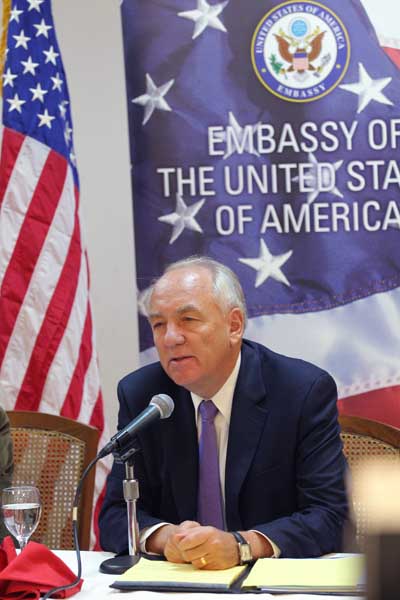Subscribe to ShahidulNews
By Rahnuma Ahmed
Because of its power and global interests U.S. leaders have committed crimes as a matter of course and structural necessity. A strict application of international law would … have given every U.S. president of the past 50 years Nuremberg treatment.
Edward S Herman, American professor of economics
The crimes of the U.S. throughout the world have been systematic, constant, clinical, remorseless, and fully documented but nobody talks about them.
Harold Pinter, English dramatist
WHEN I read of the US ambassador at-large for war crimes Stephen Rapp?s impending visit to Bangladesh, to offer advice to the government on how to try Bangladeshi war criminals of 1971, I was reminded of a personal experience more than a decade ago.
Jahangirnagar University, where I was teaching, was in turmoil. A thousand-plus students, mostly women, spilled out of classrooms to protest against campus rape. Demonstrations. Rallies. Sit-ins. ?We want an independent enquiry. Punish the rapist!? they chanted, as they pointed fingers at Jasimuddin Manik, general secretary of the Bangladesh Chhatra League, JU unit.
Two, maybe three days later, the Chhatra League, too, was out in full force. Led by Manik, I watched the procession wind its way along the corridors, march down brick-laden pathways. ?We want justice. Punish the rapist!?
It?s known as deceit.
One must admit, it was cleverly done. At the very outset of his press conference on January 13, Rapp spoke of his personal ?disappointment? in his ?own government?, in the ?highest [American] leadership during that period? when ?enormous crimes? had been committed, then quickly shifted, in the same breath, to expressing ?pride in the leadership? exercised by late Senator Edward Kennedy, and the role of Archer Blood, US Consul General in Dhaka, in providing ?accurate reports of the atrocities.? Implying, thereby, that one absolved the other.
No mention of Henry Kissinger, the then national security adviser, who is, in the words of investigative journalist Wayne Madsen, the ?most prominent unindicted war criminal roaming around today.? Kissinger had, in late April 1971, at the very height of mass murder?at least ten thousand civilians had been slaughtered in the first 3 days, the following 9 months had been marked by mass rape, genocide and dismemberment, the eventual civilian death toll put as high as 3 million?sent a message to Pakistan?s ruler General Yahya Khan, thanking him for his ?delicacy and tact? (Christopher Hitchens, The Trial of Henry Kissinger, 2002).
No mention of Archer Blood?s immediate recall from his post either, for having been the senior signatory to the April 6, 1971 cable from Dhaka. Nor, heaven forbid, of the fact that Blood reported not so much the genocide, as the US government?s ?complicity? in the genocide. ?Our government has failed to denounce the suppression of democracy. Our government has failed to denounce atrocities…[instead it has bent] over backwards to placate the West Pak[istan] dominated government…Our government has evidenced what many will consider moral bankrupt, ironically at a time when the USSR sent President Yahya Khan a message defending democracy… We, as professional civil servants, express our dissent with current policy and fervently hope that our true and lasting interests here can be defined and our policies redirected.?

Nor any mention of the punishment meted out to the cable?s other signatories. The cable, ?the most public and the most strongly worded demarche from State Department servants to the State Department that has ever been recorded? was signed by 20 members of the US diplomatic team here and, by a further 9 senior officers in the South Asia division in Washington. Being a vengeful man, Kissinger ?downgraded? them after becoming the secretary of state in 1973.
Continue reading “But what about US war crimes, Mr Ambassador-at-large?”
